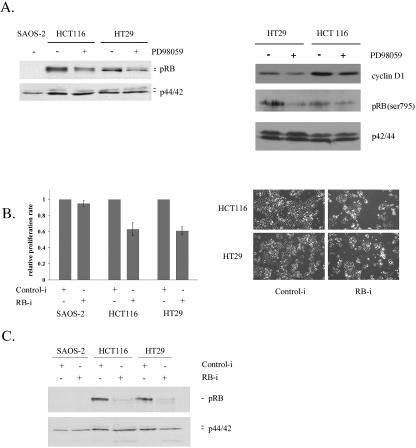FIG. 5.
pRB is required for the proliferation of human tumor cells harboring Ras mutations. (A) pRB protein levels in colorectal tumor lines are decreased by inhibition of MAPK signaling. The right panel is a Western blot of pRB protein levels in confluent HCT116 and HT29 colorectal tumor lines after treatment with dimethyl sulfoxide control or PD98059 for 15 h, as indicated. An equivalent number of cells were used for Western blot analysis, using the total amount of p44/42 as an internal control. The right panel show an analysis of cyclin D and phosphorylated pRB as indicated in the figure. Confluent cell populations were used for these experiments to minimize cell cycle effects. (B) Saos-2 cells (human osteosarcoma deficient in pRB, used as a control for nonspecific siRNA effects), HCT116 and HT29 (human colorectal tumor lines with normal pRB and activating K-Ras and Raf mutations, respectively) cells were transfected with control siRNA oligonucleotides or Rb-siRNA oligonucleotides. Cells were counted two days posttransfection and the bar graphs illustrate the relative rate of proliferation of each cell line following Rb-siRNA transfection (RB-i) compared to that of cells transfected with control siRNA (Control-i). The results are based on three independent experiments, performed in duplicate. To the right of the graphs are representative microscopy images of HCT116 and HT29 cells transfected with control or Rb-siRNA oligonucleotides 2 days posttransfection, as indicated. (C) Western blot analysis illustrating the decrease in pRB protein seen after transfection with Rb-siRNAi oligonucleotides compared to controls, using total p44/42 as a loading control.

